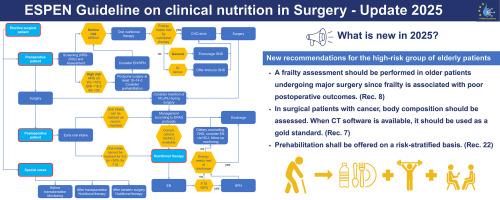ESPEN外科临床营养指南-更新2025。
IF 7.4
2区 医学
Q1 NUTRITION & DIETETICS
引用次数: 0
摘要
早期口服喂养是手术患者首选的营养方式。在大手术后的术后过程中,避免任何营养治疗都有进食不足的风险。考虑到营养不良和喂养不足是术后并发症的危险因素,对于任何有营养风险的手术患者,特别是上消化道手术患者,营养治疗是强制性的。本指南的重点是涵盖加强术后恢复(ERAS)概念的营养方面,以及接受重大手术(例如癌症)的患者的特殊营养需求,以及尽管有最佳围手术期护理但仍出现严重并发症的患者。从代谢和营养的角度来看,围手术期护理的关键方面包括:a)将营养纳入患者的整体管理;b)避免术前长时间禁食;c)术后尽早重新开始口服喂养;d)一旦出现营养风险,尽早开始营养治疗;e)代谢控制,如血糖;f)减少加剧应激相关分解代谢或损害胃肠功能的因素;g)术后尽量减少使用麻痹药物的时间。h)早期动员,促进蛋白质合成和肌肉功能。该指南为接受选择性和非选择性手术的患者的临床实践提出了44条建议,包括对虚弱评估、肌肉减少症诊断和康复的新建议。与以前的ESPEN实际准则一样,这些建议也在决策流程图中提出。本文章由计算机程序翻译,如有差异,请以英文原文为准。

ESPEN guideline on clinical nutrition in surgery – Update 2025
Early oral feeding is the preferred mode of nutrition for surgical patients. Avoidance of any nutritional therapy bears the risk of underfeeding during the postoperative course after major surgery. Considering that malnutrition and underfeeding are risk factors for postoperative complications, nutritional therapy is mandatory for any surgical patient at nutritional risk, especially for those undergoing upper gastrointestinal surgery. The focus of this guideline is to cover nutritional aspects of the Enhanced Recovery After Surgery (ERAS) concept and the special nutritional needs of patients undergoing major surgery, e.g. for cancer, and of those developing severe complications despite best perioperative care. From a metabolic and nutritional point of view, the key aspects of perioperative care include: a) Integration of nutrition into the overall management of the patient, b) avoidance of long periods of preoperative fasting c) re-establishment of oral feeding as early as possible after surgery d) start of nutritional therapy early, as soon as a nutritional risk becomes apparent e) metabolic control e.g. of blood glucose, f) reduction of factors which exacerbate stress-related catabolism or impair gastrointestinal function, g) minimized time on paralytic agents in the postoperative period, and h) early mobilization to facilitate protein synthesis and muscle function.
The guideline presents 44 recommendations for clinical practice in patients undergoing elective and non-elective surgery, including new recommendations for frailty assessment, sarcopenia diagnosis, and prehabilitation. As in the former ESPEN practical guideline, the recommendations were additonally presented in decision-making flowcharts.
求助全文
通过发布文献求助,成功后即可免费获取论文全文。
去求助
来源期刊

Clinical nutrition
医学-营养学
CiteScore
14.10
自引率
6.30%
发文量
356
审稿时长
28 days
期刊介绍:
Clinical Nutrition, the official journal of ESPEN, The European Society for Clinical Nutrition and Metabolism, is an international journal providing essential scientific information on nutritional and metabolic care and the relationship between nutrition and disease both in the setting of basic science and clinical practice. Published bi-monthly, each issue combines original articles and reviews providing an invaluable reference for any specialist concerned with these fields.
 求助内容:
求助内容: 应助结果提醒方式:
应助结果提醒方式:


